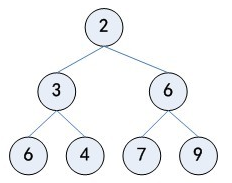Python常用数据结构之heapq模块
Python数据结构常用模块:collections、heapq、operator、itertools
heapq
堆是一种特殊的树形结构,通常我们所说的堆的数据结构指的是完全二叉树,并且根节点的值小于等于该节点所有子节点的值

常用方法
| heappush(heap,item) | 往堆中插入一条新的值 |
| heappop(heap) | 从堆中弹出最小值 |
| heapreplace(heap,item) | 从堆中弹出最小值,并往堆中插入item |
| heappushpop(heap,item) | Python3中的heappushpop更高级 |
| heapify(x) | 以线性时间将一个列表转化为堆 |
| merge(*iterables,key=None,reverse=False) | 合并对个堆,然后输出 |
| nlargest(n,iterable,key=None) | 返回可枚举对象中的n个最大值并返回一个结果集list |
| nsmallest(n,iterable,key=None) | 返回可枚举对象中的n个最小值并返回一个结果集list |
常用方法示例
#coding=utf-8 import heapq
import random def test():
li = list(random.sample(range(100),6))
print (li) n = len(li)
#nlargest
print ("nlargest:",heapq.nlargest(n, li))
#nsmallest
print ("nsmallest:", heapq.nsmallest(n, li))
#heapify
print('original list is', li)
heapq.heapify(li)
print('heapify list is', li)
# heappush & heappop
heapq.heappush(li, 105)
print('pushed heap is', li)
heapq.heappop(li)
print('popped heap is', li)
# heappushpop & heapreplace
heapq.heappushpop(li, 130) # heappush -> heappop
print('heappushpop', li)
heapq.heapreplace(li, 2) # heappop -> heappush
print('heapreplace', li)
>>> [15, 2, 50, 34, 37, 55]
>>> nlargest: [55, 50, 37, 34, 15, 2]
>>> nsmallest: [2, 15, 34, 37, 50, 55]
>>> original list is [15, 2, 50, 34, 37, 55]
>>> heapify list is [2, 15, 50, 34, 37, 55]
>>> pushed heap is [2, 15, 50, 34, 37, 55, 105]
>>> popped heap is [15, 34, 50, 105, 37, 55]
>>> heappushpop [34, 37, 50, 105, 130, 55]
>>> heapreplace [2, 37, 50, 105, 130, 55]
堆排序示例
heapq模块中有几张方法进行排序:
方法一:
#coding=utf-8 import heapq def heapsort(iterable):
heap = []
for i in iterable:
heapq.heappush(heap, i) return [heapq.heappop(heap) for j in range(len(heap))] if __name__ == "__main__":
li = [30,40,60,10,20,50]
print(heapsort(li))
>>>> [10, 20, 30, 40, 50, 60]
方法二(使用nlargest或nsmallest):
li = [30,40,60,10,20,50]
#nlargest
n = len(li)
print ("nlargest:",heapq.nlargest(n, li))
#nsmallest
print ("nsmallest:", heapq.nsmallest(n, li))
>>> nlargest: [60, 50, 40, 30, 20, 10]
>>> nsmallest: [10, 20, 30, 40, 50, 60]
方法三(使用heapify):
def heapsort(list):
heapq.heapify(list)
heap = [] while(list):
heap.append(heapq.heappop(list)) li[:] = heap
print (li) if __name__ == "__main__":
li = [30,40,60,10,20,50]
heapsort(li)
>>> [10, 20, 30, 40, 50, 60]
堆在优先级队列中的应用
需求:实现任务的添加,删除(相当于任务的执行),修改任务优先级
pq = [] # list of entries arranged in a heap
entry_finder = {} # mapping of tasks to entries
REMOVED = '<removed-task>' # placeholder for a removed task
counter = itertools.count() # unique sequence count def add_task(task, priority=0):
'Add a new task or update the priority of an existing task'
if task in entry_finder:
remove_task(task)
count = next(counter)
entry = [priority, count, task]
entry_finder[task] = entry
heappush(pq, entry) def remove_task(task):
'Mark an existing task as REMOVED. Raise KeyError if not found.'
entry = entry_finder.pop(task)
entry[-1] = REMOVED def pop_task():
'Remove and return the lowest priority task. Raise KeyError if empty.'
while pq:
priority, count, task = heappop(pq)
if task is not REMOVED:
del entry_finder[task]
return task
raise KeyError('pop from an empty priority queue')
Python常用数据结构之heapq模块的更多相关文章
- Python常用数据结构之collections模块
Python数据结构常用模块:collections.heapq.operator.itertools collections collections是日常工作中的重点.高频模块,常用类型由: 计数器 ...
- Python常用内置模块之xml模块
xml即可扩展标记语言,它可以用来标记数据.定义数据类型,是一种允许用户对自己的标记语言进行定义的源语言.从结构上,很像HTML超文本标记语言.但他们被设计的目的是不同的,超文本标记语言被设计用来显示 ...
- Python常用的内建模块
PS:Python之所以自称“batteries included”,就是因为内置了许多非常有用的模块,无需额外安装和配置,即可直接使用.下面就来看看一些常用的内建模块. 参考原文 廖雪峰常用的内建模 ...
- python常用数据结构讲解
一:序列 在数学上,序列是被排成一排的对象,而在python中,序列是最基本的数据结构.它的主要特征为拥有索引,每个索引的元素是可迭代对象.都可以进行索引,切片,加,乘,检查成员等操作.在py ...
- python常用数据结构(1)
python中有四种最常用的数据结构,分别是列表(list),字典(dict),集合(set)和元组(tuple) 下面简单描述下它们的区别和联系 1.初始化 不得不说,python数据结构的初始化比 ...
- Python常用数据结构(列表)
Python中常用的数据结构有序列(如列表,元组,字符串),映射(如字典)以及集合(set),是主要的三类容器 内容 序列的基本概念 列表的概念和用法 元组的概念和用法 字典的概念和用法 各类型之间的 ...
- python 常用数据结构使用
python 字典操作 http://www.cnblogs.com/kaituorensheng/archive/2013/01/24/2875456.html python 字典排序 http:/ ...
- python常用数据结构的常用操作
作为基础练习吧.列表LIST,元组TUPLE,集合SET,字符串STRING等等,显示,增删,合并... #===========List===================== shoplist ...
- python常用数据结构
0. 字典初始化 d = {'a':1,'b':2} 或 d={} d['a'] = 1 d['b'] = 2 是不是和json格式数据很相似,语法和JavaScript又很相似 1. 变量接受序列分 ...
随机推荐
- Python 3 生成手写体数字数据集
0.引言 平时上网干啥的基本上都会接触验证码,或者在机器学习学习过程中,大家或许会接触过手写体识别/验证码识别之类问题,会用到手写体的数据集: 自己尝试写了一个生成手写体图片的python程序,在此分 ...
- Python中执行系统命令常见的几种方法
(1) os.system 这个方法是直接调用标准C的system() 函数,仅仅在一个子终端运行系统命令,而不能获取命令执行后的返回信息. import os os.system('cat /pro ...
- mybatis-枚举类型的typeHandler&自定义枚举类型typeHandler
MyBatis内部提供了两个转化枚举类型的typeHandler给我们使用. org.apache.ibatis.type.EnumTypeHandler 是使用枚举字符串名称作为参数传递的 org. ...
- java—— finall 关键词
_ *{ margin: 0; padding: 0; } .on2{ margin: 10px 0; cursor: pointer; user-select: none; color: white ...
- vm虚拟机中linux无法连接外网?
问题出现的环境? vm虚拟机中安装了linux系统,vm设置了NAT方式共享主机ip,但还是没法访问外网?在linux系统中查询ip地址,没有ipv4地址,就是配置了自动获取,但是还是没有获取? 问题 ...
- AI_深度学习概论
什么是是神经网络? 假如有6间房屋的数据集,已知房子的面积,单位是平方米或平方英尺,已知房子的价格.如果通过这6间房子的价格和房子的面积,预测房子的价格,首先要建立起一个数据模型 ,x轴为价格,y轴为 ...
- Java 线程和多线程执行过程分析
*/ .hljs { display: block; overflow-x: auto; padding: 0.5em; color: #333; background: #f8f8f8; } .hl ...
- html中几种常见长度单位介绍
其实css中的长度单位一共有8个,分别是px,em,pt,ex,pc,in,mm,cm: px:像素(Pixel),相对于设备的长度单位,像素是相对于显示器屏幕分辨率而言的.譬如,WONDOWS的用户 ...
- mysql has gone away
mysql出现ERROR : (2006, 'MySQL server has gone away') 的问题意思就是指client和MySQL server之间的链接断开了. 造成这样的原因一般是s ...
- Nagios在selinux开启的情况下使用
# chcon -R -t httpd_sys_content_t /usr/local/nagios/sbin/ # chcon -R -t httpd_sys_content_t /usr/loc ...
